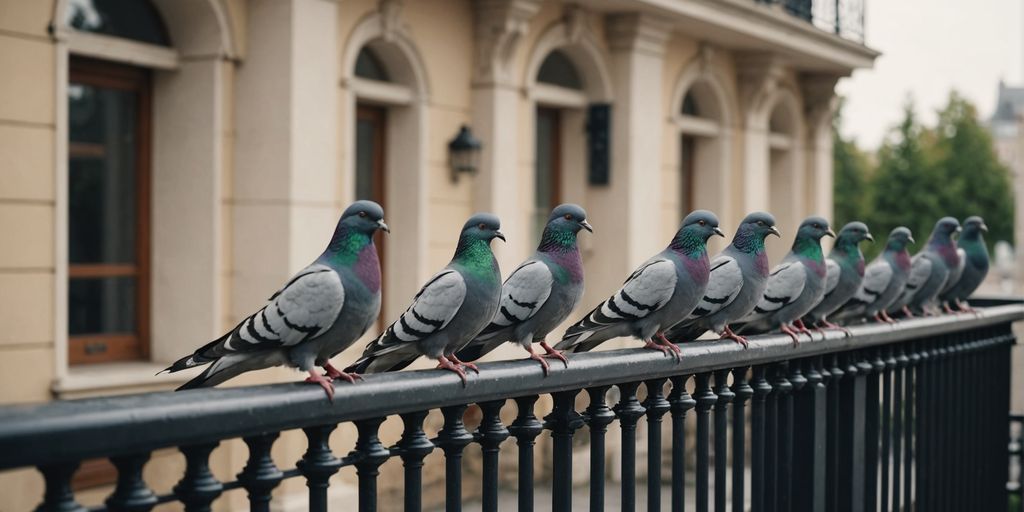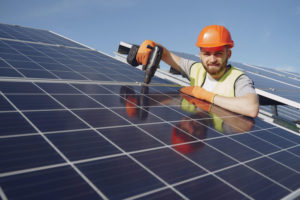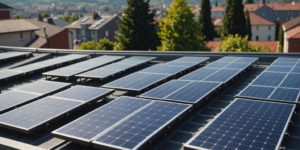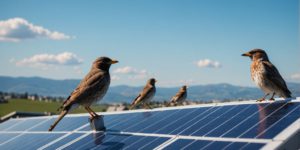Pigeons can be a significant nuisance when they choose to nest in and around your home. Not only can they cause damage to property, but their droppings can also pose health risks. Understanding how to effectively deter pigeons from nesting is crucial for maintaining a clean and safe environment. This article will guide you through various strategies to stop pigeons from nesting, covering everything from physical barriers to chemical repellents and professional pest control services.
Key Takeaways
- Understanding pigeon behavior is the first step in effectively deterring them from nesting in urban areas.
- Securing your home’s exterior with bird spikes, netting, and other barriers can prevent pigeons from finding nesting spots.
- Visual and auditory deterrents, such as fake predators and ultrasonic repellents, can be effective in keeping pigeons away.
- Maintaining cleanliness and proper waste management is crucial to making your property less attractive to pigeons.
- Professional pest control services can offer long-term solutions and should be considered if DIY methods are not effective.
Understanding Pigeon Behavior
Why Pigeons Nest in Urban Areas
Pigeons have a long history of cohabitation with humans, which has made them fearless and confident in nesting around our homes. Urban areas provide ample food sources and shelter, making them ideal for pigeons. The abundance of ledges, rooftops, and other structures mimics their natural cliffside habitats.
Common Nesting Sites for Pigeons
Pigeons often choose locations that offer protection from predators and harsh weather. Common nesting sites include:
- Building ledges
- Under bridges
- Rooftops
- Eaves and attics
- Solar panels
These sites provide the necessary shelter and safety for raising their young.
Pigeon Breeding Patterns
Pigeons breed year-round, with peak breeding seasons in spring and summer. A typical pigeon pair can produce multiple broods per year, each consisting of two eggs. The rapid breeding cycle contributes to their large populations in urban areas.
Understanding pigeon behavior is crucial for implementing effective deterrent methods and protecting your property from potential damage.
Securing Your Home’s Exterior
To effectively prevent pigeons from nesting around your home, it’s crucial to secure the exterior. Blocking potential entry points and using various deterrents can make a significant difference.
Deterring Pigeons with Visual and Auditory Devices
To effectively deter pigeons, employing a combination of visual and auditory devices can be highly effective. These methods are designed to create an environment that is unwelcoming to pigeons, encouraging them to nest elsewhere. Using a variety of deterrents together can enhance their effectiveness.
Fake Predators
One of the simplest and most cost-effective methods is to use fake predators. These can include plastic owls or rubber snakes, which can be strategically placed around your property. While pigeons may eventually become accustomed to these decoys, they can be quite effective in the short term. For best results, move the decoys periodically to maintain their effectiveness.
Reflective Objects
Reflective objects can also serve as a deterrent. Items such as old CDs, aluminum foil strips, or specialized reflective tape can be hung in areas where pigeons are likely to nest. The reflections and movements of these objects can confuse and scare pigeons away. This method is particularly useful in gardens and open spaces.
Ultrasonic Repellents
Ultrasonic devices emit sound waves that are irritating to pigeons but inaudible to humans. These devices are often used in agricultural settings but are becoming more popular for residential use. While effective, it’s important to note that pigeons may return once the device is turned off. Additionally, some ultrasonic devices can affect other animals, including pets. Therefore, it’s crucial to choose a device that is safe for all the inhabitants of your home.
Combining visual and auditory deterrents can create a more comprehensive strategy for keeping pigeons at bay. By making your property less attractive to these birds, you can significantly reduce the chances of them nesting in unwanted areas.
Maintaining Cleanliness to Prevent Nesting
Keeping your surroundings clean and uncluttered is crucial in deterring pigeons from nesting. Pigeons prefer sheltered spots for nesting, often finding refuge behind furniture and storage items. Regularly sweeping away any new nesting material can significantly reduce the chances of pigeons settling in. Even your frequent presence in areas like balconies can discourage them from nesting.
Regular Cleaning Routines
- Daily Sweeping: Make it a habit to sweep away any nesting materials or droppings daily. This not only keeps the area clean but also signals to pigeons that the space is not suitable for nesting.
- Furniture Management: Store away or cover any items that could provide shelter for pigeons. Keeping the area open and exposed will make it less attractive to them.
Proper Waste Management
Ensure that trash cans, recycling bins, and compost bins are secure and do not provide pigeons with food. Cleaning up scraps after outdoor meals and ensuring they can’t access pet food will also help deter other pests like rats and mice.
Removing Food Sources
- Secure Trash Bins: Make sure all trash bins are tightly closed and not easily accessible to pigeons.
- Clean Up After Meals: Always clean up immediately after outdoor meals to remove any food scraps that might attract pigeons.
- Pet Food: Ensure that pet food is not left outside where pigeons can access it.
By maintaining a clean and uncluttered environment, you create a less inviting space for pigeons to nest. This proactive approach is one of the most effective ways to prevent pigeon nesting.
Remember, the key to preventing pigeons from nesting is consistent and thorough cleaning. This simple yet effective strategy can save you from the hassle of dealing with pigeon nests in the future.
Using Chemical and Natural Repellents
Non-Toxic Sprays
Non-toxic sprays are a popular choice for deterring pigeons. These sprays often contain essential oils that are offensive to pigeons but safe for humans and pets. They can be applied to ledges, roofs, and other common nesting areas. However, they may require frequent reapplication, especially after rain or heavy winds.
Spices and Scents Pigeons Dislike
Certain spices and scents are known to repel pigeons effectively. Common options include:
- Cayenne pepper
- Cinnamon
- Black pepper
These can be sprinkled around nesting sites or mixed with water to create a spray. The strong smell and taste deter pigeons from settling in those areas.
Commercial Repellent Products
There are various commercial products available that are specifically designed to repel pigeons. These include gels, pastes, and fogs. Gels and pastes can be applied to perching areas, making the surface sticky and uncomfortable for pigeons. Fogs and vapors are ideal for larger indoor areas and can cover a significant volume. However, these products often require consistent reapplication to remain effective.
Using a combination of these methods can provide a more comprehensive approach to pigeon control, ensuring that your property remains pigeon-free.
Protecting Solar Panels from Pigeon Damage
Pigeons can cause significant damage to solar panels by nesting underneath them, leading to reduced efficiency and potential damage. Implementing effective measures to protect your solar panels is crucial for maintaining their performance and longevity. Here are some strategies to help you safeguard your investment.
Installing Mesh Around Panels
One of the most effective ways to prevent pigeons from nesting under your solar panels is by installing mesh around the panels. This creates a barrier that keeps pigeons and other critters out. Mesh is easy to install and can be removed for maintenance. Consider using a Solar Panel Critter Guard or Solar Panel Mesh Clips for a secure fit.
Using Bird Spikes on Panels
Bird spikes are another excellent solution to deter pigeons. These spikes can be installed on the edges of the panels to prevent pigeons from landing and nesting. Pigeon Spikes For Solar Panels are designed to be durable and withstand various weather conditions. They are a humane way to keep pigeons away without causing them harm.
Regular Cleaning and Maintenance
Regular cleaning and maintenance of your solar panels are essential to ensure they remain efficient and free from pigeon droppings and debris. Schedule periodic inspections to check for any signs of nesting or damage. Using a Solar Panel Protective Cover can also help protect the panels from dirt and debris.
Maintaining your solar panels not only ensures their efficiency but also extends their lifespan, providing you with a better return on investment.
By implementing these measures, you can effectively protect your solar panels from pigeon damage and ensure they continue to operate at peak efficiency.
Legal and Ethical Considerations
When dealing with pigeon control, it’s crucial to be aware of the legal and ethical considerations involved. Different regions have varying laws and regulations regarding wildlife protection, and it’s essential to comply with these to avoid legal repercussions.
Wildlife Protection Laws
In many areas, pigeons and other birds are protected under wildlife laws. For instance, the deliberate harming or killing of pigeons, or disturbing their active nests, can be illegal. Always check your local ordinances to ensure that your pigeon control methods are compliant.
Humane Deterrent Methods
Using humane methods to deter pigeons is not only ethical but often more effective in the long run. Methods such as bird spikes, netting, and fake predators can help keep pigeons away without causing them harm. It’s important to design your deterrent system thoughtfully to ensure it is both effective and humane.
When to Call Professionals
Sometimes, despite your best efforts, pigeon problems can persist. In such cases, it may be wise to call in professional pest control services. Professionals are well-versed in both the legal aspects and the most effective, humane methods for dealing with pigeon infestations.
DIY Solutions for Pigeon Control

Creating Homemade Repellents
One effective way to deter pigeons is by creating homemade repellents. Spices and scents that pigeons dislike can be used to keep them away. For instance, you can sprinkle cayenne pepper or cinnamon around areas where pigeons tend to gather. Another option is to use a mixture of water and crushed chili peppers in a spray bottle and apply it to surfaces where pigeons perch.
Building Physical Barriers
Physical barriers are a practical solution to prevent pigeons from nesting. You can use materials like Anti Bird Wire or mesh to block access to common nesting sites. Installing these barriers around ledges, eaves, and other potential nesting areas can effectively keep pigeons at bay.
Using Household Items as Deterrents
Household items can also be repurposed to deter pigeons. Reflective objects like old CDs or aluminum foil can be hung in areas where pigeons are a problem. The reflections and movements of these items can scare pigeons away. Additionally, placing a few plastic owls or other fake predators around your property can help in deterring pigeons.
For those looking for a cost-effective and humane way to manage pigeon problems, DIY solutions can be a great starting point. However, if the problem persists, it may be time to consider a Pigeon Removal Service.
Bird Spike Installation Cost
If you’re considering more permanent solutions, bird spikes are an excellent option. They prevent pigeons from landing and nesting on surfaces. The Bird Spike Installation Cost can vary depending on the size of the area and the type of spikes used. Generally, the cost ranges from $100 to $300 for a standard installation, making it a worthwhile investment for long-term pigeon control.
Hiring Professional Pest Control Services
When to Consider Professional Help
If your pigeon problem has escalated beyond simple DIY solutions, it might be time to call in the experts. Professional pest control services can offer specialized knowledge and tools that are not readily available to the average homeowner. Companies like Goldshot Exterminating have extensive experience in dealing with pigeon infestations and can provide effective, long-term solutions.
What to Expect from Pest Control Services
When you hire a pest control service, you can expect a thorough inspection of your property to identify nesting sites and entry points. The professionals will then implement a customized plan to deter pigeons, which may include the use of bird spikes, netting, and other deterrents. They will also provide advice on maintaining your property to prevent future infestations.
Cost of Professional Pigeon Control
The cost of hiring professional pest control services can vary widely depending on the extent of the infestation and the methods used. Here’s a simple breakdown:
| Service Type | Estimated Cost Range |
|---|---|
| Initial Inspection | $100 – $200 |
| Bird Spikes Installation | $300 – $500 |
| Netting Installation | $500 – $1,000 |
| Ongoing Maintenance | $100 – $300 per visit |
Investing in professional pest control services can save you money in the long run by preventing damage to your property and reducing the need for frequent clean-ups.
By considering professional help, you can ensure that your pigeon problem is handled efficiently and humanely, protecting both your property and the birds.
Long-Term Strategies for Pigeon Prevention
Regular Property Inspections
Conducting regular property inspections is crucial in identifying potential nesting sites and addressing them before they become a problem. Look for signs of pigeon activity, such as droppings or nesting materials, and take immediate action to remove them. Regular inspections can help you stay ahead of any issues and maintain a pigeon-free environment.
Ongoing Maintenance Tips
Maintaining your property is key to preventing pigeons from nesting. Here are some ongoing maintenance tips:
- Seal entry points: Ensure that all potential entry points, such as gaps in roofs or walls, are sealed properly.
- Install deterrents: Use bird spikes, netting, or other deterrents to make your property less attractive to pigeons.
- Clean regularly: Keep your property clean and free of food scraps or other attractants.
Community Efforts to Reduce Pigeon Population
Community efforts can be highly effective in reducing the pigeon population in urban areas. By working together, communities can implement strategies such as:
- Public awareness campaigns: Educate residents about the importance of not feeding pigeons and maintaining cleanliness.
- Collective action: Organize community clean-up events to remove potential food sources and nesting materials.
- Collaboration with local authorities: Work with local authorities to implement and enforce regulations that deter pigeon feeding and nesting.
By taking a proactive approach and involving the community, long-term pigeon prevention becomes more manageable and effective.
Implementing long-term strategies for pigeon prevention is essential for maintaining clean and safe environments. Discover effective solutions and expert advice on our website to keep your property pigeon-free for years to come.
Conclusion
In conclusion, preventing pigeons from nesting on your property requires a multifaceted approach. By employing a combination of physical barriers such as netting, spikes, and mesh, along with deterrents like fake birds of prey and regular cleaning, you can effectively protect your solar panels and other vulnerable areas. Regular maintenance and proactive measures are essential to ensure that your efforts remain effective over time. Remember, the goal is not only to protect your property but also to do so in a humane and environmentally friendly manner. By taking these steps, you can enjoy a pigeon-free environment and maintain the efficiency and longevity of your solar panels.
Frequently Asked Questions
Why do pigeons prefer nesting in urban areas?
Pigeons are attracted to urban areas because they provide ample food sources, shelter, and fewer natural predators. Buildings and other structures mimic the cliffs and ledges they would naturally nest on.
What are the most common nesting sites for pigeons around homes?
Pigeons commonly nest on ledges, roofs, chimneys, attics, sheds, and barns. They look for sheltered spots that offer protection from the elements and predators.
How can I block entry points to prevent pigeons from nesting?
You can block entry points by sealing gaps, installing bird netting, and using bird spikes. Ensure that all potential nesting sites are covered to prevent pigeons from gaining access.
Are bird spikes effective in deterring pigeons?
Yes, bird spikes are effective in deterring pigeons. They create an uncomfortable landing area, preventing pigeons from roosting and nesting. However, they must be installed correctly and maintained regularly.
What are some natural repellents for pigeons?
Natural repellents for pigeons include spices and scents that they dislike, such as cayenne pepper, cinnamon, and vinegar. These can be sprinkled or sprayed in areas where pigeons are a problem.
How often should I clean my solar panels to prevent pigeon nesting?
To prevent pigeon nesting and maintain efficiency, it’s recommended to clean solar panels at least once a year. Regular cleaning helps remove dirt, debris, and bird droppings that can accumulate over time.
Is it legal to remove pigeon nests from my property?
The legality of removing pigeon nests depends on local wildlife protection laws. It’s important to check with local authorities before removing nests to ensure compliance with regulations.
When should I consider hiring professional pest control services for pigeon problems?
You should consider hiring professional pest control services if DIY methods are ineffective, if the pigeon problem is severe, or if you are unable to safely install deterrents and repellents yourself.



